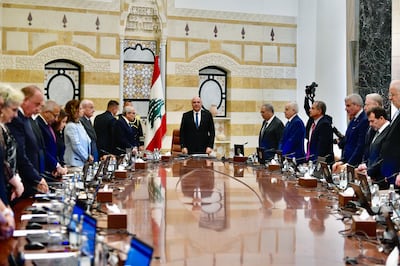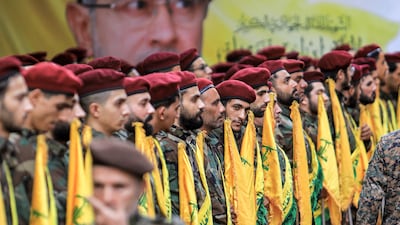Hezbollah has condemned a Lebanese government plan to disarm the group as a “grave sin” that it would treat “as if it does not exist".
Hezbollah's reaction has raised fears that Israel could step up attacks on Lebanon and inflame tension within the country.
On Tuesday, following a stormy cabinet meeting, the government said it would ask the Lebanese Army to present a plan to bring all weapons under state control by the end of the year.
Iran-backed Hezbollah, a Lebanese armed group and political party, has repeatedly said it rejects any discussions over its arms until Israel stops its daily bombings of Lebanon and withdraws from the five points of Lebanese territory it still occupies.
On Wednesday, Hezbollah said the government decision weakened Lebanon’s position in the face of Israeli and US "threats" against the country.
“This decision fully serves Israel’s interests and leaves Lebanon exposed to the Israeli enemy without deterrence,” the group said.
It came as the US is exerting intense pressure for the Lebanese cabinet to commit and set out a timetable for Hezbollah's disarmament, and amid rising fears that Israel will step up its attacks on the country.
It contrasts sharply with the rhetoric coming from those opposed to Hezbollah, who have praised the government's latest move.
"Yesterday was a historic decision by the government," said a source close to the four ministers nominated by the anti-Hezbollah Lebanese Forces, which include Foreign Minister Youssef Raggi. "There is no grey area in this – it is crystal clear. What was lacking before was the political resolution, and the political resolution is here today.
"Believe me, if there was any grey area, we would have pulled out of the [cabinet] session and voiced that we are against this resolution, and whatever was stated by the government does not represent our supporters."
Michel Moawad, an independent MP also deeply critical of Hezbollah, said it was a "turning point for Lebanon."
He said: "This is how we protect Lebanon from another devastating war, by restoring sovereignty, enforcing the rule of law and building a strong, united state."
Dictates
Hezbollah said it views the cabinet decision as "the result of dictates from US envoy Tom Barrack, referring to a proposal he submitted to authorities calling for the group's disarmament within a timetable.
It "fully serves Israel's interests and leaves Lebanon exposed to the Israeli enemy without any deterrence", said Hezbollah.

The group added that it was "prepared to discuss a national security strategy", but not under Israeli fire.
While the cabinet meeting was under way, Hezbollah chief Naim Qassem said "any timetable presented for implementation" while Israel continued its attacks and occupation "cannot be agreed to".
The cabinet discussion on a US proposal, which includes disarming Hezbollah, will continue on Thursday. One source close to the government was keen to point out that the US road map also includes issues unrelated to weapons, such as economic reforms and Syrian refugees.
But critics of Hezbollah said the most important thing had been decided: setting out a disarmament timetable, giving the army until August 31 to present a plan to bring all weapons under state control by the end of the year.
It was that which angered Hezbollah and its supporters, with Information Minister Paul Marcos saying Health Minister Rakan Nassereldine, nominated by Hezbollah, and Environment Minister Tamara Elzein, who was nominated by its ally the Amal Movement, "withdrew from the session because they did not agree with the cabinet decision" on Tuesday.
It is unclear whether the two ministers will be present at the Thursday meeting of the cabinet. Another two ministers nominated by Amal and Hezbollah were not at the meeting at the presidential palace in Baabda on Tuesday because they were travelling.
On Wednesday, Amal said Lebanon's government should focus on consolidating the shaky November ceasefire with Israel and said Thursday's cabinet session would be a chance to correct course.
The cabinet is made up of ministers nominated by a variety of opposing political parties, as well as independents nominated by the President and Prime Minister.
The US proposals would also see Israel withdraw from Lebanese territory and end its daily bombings of Lebanon.
While Hezbollah was weakened by its war with Israel last year, it was not destroyed and retains some military power. It also commands strong backing from some in Lebanon, but particularly within its core Shiite support base.
There are fears that sectarian strife could be significantly stoked if the weapons argument is not dealt with in the right way.



